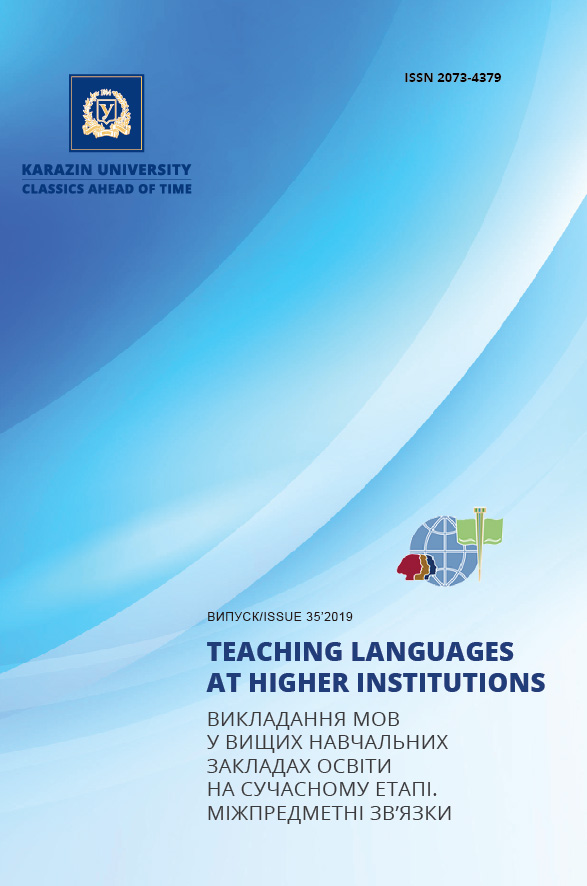Problems of determining communicative needs for the formation of the Ukrainian-speaking competence of foreign students of higher education institutions of Ukraine
Abstract
The article discusses the main components of the system of communicative needs of foreign students in educational activities. One of the main tasks as the basis for setting aims and in accordance with the content of education in higher education is to identify the communicative needs of foreign students. This is necessary to study the real communicative needs of foreign students in the learning process and to create, on this basis, differentiated programs that correspond to the specifics of the region, to adaptthe existing programs according to the results of such studies of the content of textbooks and presentation forms of educational material, to consolidate and control the acquired knowledge, speech skills and abilities. A general strategy is to teach the Ukrainian language as a foreign language but this choice is complicated by the lack of a Ukrainian-speaking environment and the presence of a Russian-speaking one, an insufficient number of hours for foreign students to learn the Ukrainian language. It should be noted that the identified real communicative needs of first-year students in writing in the educational and professional field also arise in the educational process in a certain sequence, which allows you to build a hierarchical system of exercises, which provides for the phased nature of the formation of relevant skills. Communicative needs are important in the formation of the linguistic competence of foreign students; it is necessary to take into account the nature of the ordering of the language system as a whole, and functional subsystems relevant for a particular student population. The language competence of foreign students should correspond to the volume and nature of the communicative needs that arise in them within the framework of various fields of activity in Ukraine, and should be formed on the basis of the literary language, when future specialists, having mastered the core of the system, naturally proceed to study the specific features of the language subsystems. This must be taken into account for a methodologically reasonable selection of the didactic material, which is systematized on the basis of the identified communicative needs.
Downloads
References
Bitehtina, G.A. and Klobukova, L.P. (1986). Kommunikativnye potrebnosti uchashhihsja i problemy formirovanija jazykovoj kompetencii studentov-nefilologov gumanitarnogo profilja [Scientific traditions and new directions in the teaching of the Russian language and literature]. Nauchnye tradiczii i novye napravleniya v prepodavanii russkogo yazyka i literatury [Scientific traditions and new directions in the teaching of the Russian language and literature]. Moscow, pp. 57–65 [in Russian].
Drozdova, I.P. (2013). Formuvannya movnoyi kompetenciyi u studentiv tehnichnih specialnostej vyshhyh navchalnyh zakladiv Shidnoyi Ukrayiny [Formation of language competence in students of technical specialties of higher educational institutions of Eastern Ukraine]. Kharkiv: Vydavnyctvo “NTMT” [in Ukrainian].
Kostomarov, V.G.(2014). Rassuzhdenija o formah teksta v obsshenii [Discussions on the forms of text in communication]. Moscow: Flinta-Nauka [in Russian].
Kozhina, M.N. (1986). O dialogichnosti pismennoj nauchnoj rechi [On the dialogic nature of written scientific speech]. Perm: Perm. un-t [in Russian].
Lahuta, T.M. (2010). Naukovyy styl ukrayinskoyi movy: vydy testovykh zavdan dlya inozemciv [Scientific style of the Ukrainian language: types of tests for foreigners]. Teoriya i praktyka vykladannya ukrayinskoyi movy yak inozemnoyi [Theory and Practice Weekend Ukrainian Language and Foreign Languages]. Lviv: Lviv. nats. un-t im. Ivana Franka, 5, pp. 22–28 [in Ukrainian].
Leontev, A.A. (2010). Jazyk, rech, rechevaja dejatelnost [Language, speech, speech activity]. Moscow: Krasand [in Russian].
Pentilyuk, M.I. (1998). Osoblivosti tehnologiyi uroku movi [Features of language lesson technology]. Dyvoslovo [Wonderword]. 4, pp. 18–20 [in Ukrainian].
Vergasov, V.M. (1985). Aktivizacija poznavatelnoj dejatelnosti studentov v vysshej shkole [Activization of cognitive activity of students in higher education]. Kyiv: Vyshha shkola [in Russian].
Zimnjaja, I.A. (1979). Problemy obuchenija ustnoj rechi [Problems of teaching oral speech]. Sbornik nauchnykh trudov MGPIIYa [Collection of scientific papers MGPII], 137, pp. 3–10 [in Russian].
Zimnjaja, I.A. (1999). Pedagogicheskaja psihologija [Pedagogical Psychology]. Moscow: Logos [in Russian].

